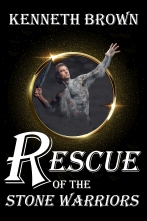Adgitize Press
Characters in Scenes
By: Ken Brown
Published: 7/3/2019
Writing Characters, Secrets and Enemies
This is a continuation on a series of writing stronger scenes for a talk I gave at my local library to the young adults. In this article I talk about characters how to introduce them, how to make them likeable and giving a character a secret.
Character
Why should I like your character? What makes someone likeable? In the first scene of the Incredibles, we find Mr. Incredible racing to stop a bad guy and just about the point where he will capture the bad guy a little old lady asks for help with her cat stuck up a tree. Mr. Incredible saves the cat and still stops the bad guy. We as readers like Mr Incredible.
Or you can have a woman find a lost dog. She takes it home, feeds it, cleans it up and then makes the effort to find the owner. We as readers will like the character.
Imagine a man in a large city like Chicago. He is going to lunch and happens to overhear a conversation a mother is having with two little children. She tells one of them that they can't eat until the shelter opens up later that night. But the child is insistent saying she's hungry now. The man takes the mother and children to a McDonald's and feeds them. Then when he gets ready to go to lunch finds that he doesn't have money to buy food for himself and goes hungry that day.
Friends, Acquaintances and Enemies
Your characters need to be different. Make one honest and maybe one of her friends a little dishonest. Make the character unreliable, in what they say, in what they do and in how they treat others. Have one character be always pristine, clean, clothes pressed and perfect. Another character, a good person, but for some reason can never keep his shirt tucked in and is that a jelly stain or part of the pattern?
How do we know what some traits of your character are? Show us where they live. Imagine two homes. Home number one you walk into the family room and you see a yoga mat on the floor and a boxing bag hanging from the ceiling. Compared to home number two a family room where there is an ashtray full of cigarette butts and potato chip bags strewn around the room and cat odor coming from someplace, you’re not quite sure where.
What are these two home owners like? You haven’t even met them, but you kind of know something about them already. Match up people with different personalities that helps to create conflict, because one person will always have a comment to make about the other person because they’re different.
What is the Character’s Secret?
Tell us about the trait that might play a major role at the end of the story that may prevent the protagonist from realizing their goal. What’s Sally’s secret that she has withheld from the hero the whole story that will be exposed at the last minute and ruin everything? Show us this trait early in the story, to where we wonder if our heroine finds out before it’s too late. Or you are ready for the climax and the successful conclusion to the story and all of a sudden this becomes an issue.
It might be a skillset she has lied about. Or a secret love affair that she didn’t reveal and hoped would stay hidden, but at the most critical part of the story, boom it’s exposed. Maybe he’s related to royalty or he is a spy for the other side and there’s no way they can ever be married. What if he's the evil businessman that is trying to buy her bookstore and tear it down to build condos. They are almost at the point where they will be lovers and she finds out that this is the person who plans to ruin her business and life. She can't love him now.
Introducing a Character
Have two characters talk about another character as a way to introduce the character to the reader. Make it conflict, where one says something and the other character interprets differently than what was intended. Two women are talking about hooking up her friend on a blind date and says,
“You’ll like Mike, he’s very athletic.”
“I’m not going on a blind date with a jock.”
“I mean he has a nice body. He’s in the top five percent of the class.”
“You’re trying to say he has no personality aren’t you?”
This method will give us information about the character even before he enters the story. We can find out his habits, how other people perceive him and give background information and then have him walk onstage in the next scene.
Recent Blog Articles
Full Moon Snow Covered Backyard
My Current Projects October 2020
Make Your Settings Do Double Duty
Understanding the Scene Process
What is a Scene Purpose or Focus
The Reaction Scene or Sequel Scene
What are the Building Blocks of a Novel
Your Writing Effort is Front Loaded
What I Learned from Reading Lee Child Books
Six Reasons to Describe Your Characters




